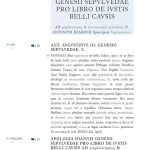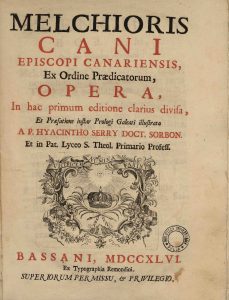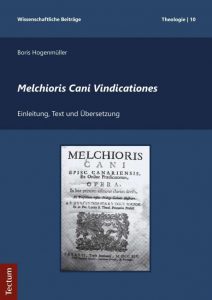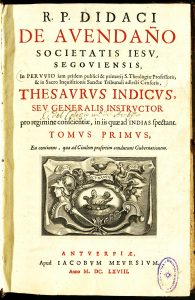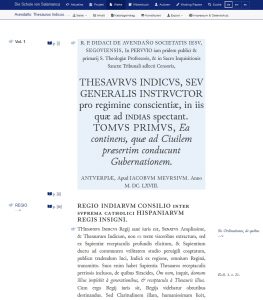After Bartolomé de las Casas, his adversary in the Valladolid debate, the humanist and historian of Charles V, Juan Ginés de Sepúlveda, is now also represented in the Digital Collection of Sources: with his «Apología pro libro de iustis belli causis» (1552). Continuar leyendo «(English) The School of Salamanca: New Digital Edition of Juan Ginés de Sepúlveda’s «Apologia» now online»
Autor: sal
(English) Juan Belda Plans: Presentación de la edición crítica y la traducción al español de la Relectio de Poenitentia de Melchor Cano
Date: 5.02.2020
Time: 14:30 – 16:00
Speaker: Juan Belda Plans (Valencia)
Organisation: Christiane Birr, José Luis Egío
Place: MPIeR
Room: Z01
After the introduction to his editing and translation project in March 2019 [https://blog.salamanca.school/de/2019/03/11/salamanca-kolloquium-observaciones-sobre-edicion-critica-de-melchor-cano-metodos-y-subsidios-para-el-trabajo/], Juan Belda Plans will be once again a guest at the Salamanca Colloquium. This time he presents the results of his work in Frankfurt: the completed critical edition of the Relectio de Poenitentia (1549) by Melchor Cano, published in 2020, with Spanish translation.
The Colloquium will be held in Spanish.
(English) Boris Hogenmüller: Melchor Cano, De locis theologicis – some remarks on concept and reception of the Loci
Date: 15.01.2020
Time: 14:30 – 16:00
Speaker: Boris Hogenmüller (Würzburg)
Organisation: Christiane Birr, José Luis Egío
Place: MPIeR
Room: Z01
With his extensive and complex major work De locis theologicis, Melchor Cano layed the foundations of modern dogmatics in theology. A German translation of this work was carfried out from 2006 to 20014 in the DFG project «Melchior Cano De locis theologicis. Critical Edition of the Latin Text and German Translation» by Elmar Klinger, Thomas Franz and Boris Hogenmüller. Subsequently, Hogenmüller edited and translated the Melchiori Cani Vindicationes by the French Dominican François-Jacques-Hyacinthe Serry, published in 1714, with which Serry defended Cano and the Loci against various theological-literary attacks. In the colloquium Boris Hogenmüller will talk about Cano, his work and its reception in the early modern period and thus give an insight into the highly intense theological-scientific discussions of the 16th and 17th centuries.
The Colloquium will be held in English.
(English) Bruna Franceschini: Reflections on the Legal Subject in the Context of Latin American Colonialism
Date: 11.12.2019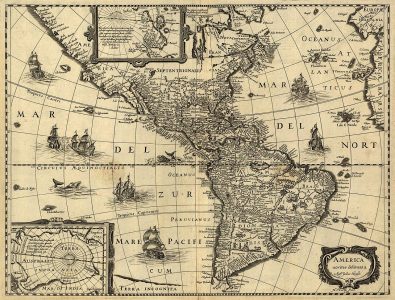
Time: 14:30 – 16:00
Speaker: Bruna Franceschini (Coimbra)
Organisation: Christiane Birr, José Luis Egío
Place: MPIeR
Room: Z01
Bruna Franceschini will talk about her doctoral research project that aims to investigate some roots of the formation of the notion of subject of Law in the context of Latin American colonialism, mainly in Brazilian context. In fact, the work is an attempt to associate the contributions of Legal History to reflections of Philosophy of Law concerning the recognition of the other for the construction of legal intersubjectivity.
The Colloquium will be held in English.
(English) Working Discussion „Translating Melchor Cano“
Date: 11.10.2019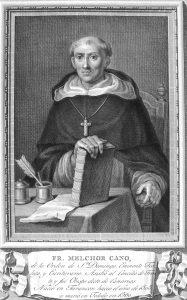
Time: 11:00 – 13:00
Speakers: Juan Belda Plans (Valencia), Elmar Klinger (Würzburg/Herzogenaurach), Boris Hogenmüller (Würzburg), Thomas Franz (Würzburg)
Organisation: Christiane Birr (MPIeR)
Location: MPIeR
Room: Z02
Melchor Cano (1509-1560) is one of the most important authors of the School of Salamanca: at the age of fifteen he entered the Dominican Order as a pupil of Francisco de Vitoria in Salamanca. At the age of twenty-five he received his first theological chair in Valladolid; after the death of his academic teacher Vitoria in 1546 he took over the renowned chair of Theology in Salamanca himself. His main work, De locis theologicis, published posthumously in Salamanca in 1563, is the fundamental work of theological knowledge of modern times and represents the first complete programme of Catholic dogmatics as an independent discipline.
A Spanish translation of this pivotal and complex work of modern theology was presented by Juan Belda Plans in 2006; Elmar Klinger, Thomas Franz and Boris Hogenmüller completed a German translation, the publication of which is still pending. The discussion will focus on the special requirements for the interpretation and translation of theological texts of the School of Salamanca, the specifics of early modern Latin and the significance of translations in the modern reception of the School of Salamanca.
Discussion languages are Spanish and German.
(English) The School of Salamanca: New Digital Edition of Diego de Avendaño’s «Thesaurus Indicus, Vol. 1» now online
Diego de Avendaño (1594-1688) was born in Segovia. During his studies in Seville, he met Juan de Solórzano Pereira and accompanied him to the New World. Avendaño continued his studies in Lima at the Colegio San Martín of the Jesuits, joined the order himself and taught and led the Jesuitic colleges and universities in Cuzco, Charcas and Lima in the following decades. After, as he himself said, «almost fifty years in Peru» he published his main work, the six-volume Thesaurus Indicus, in which he discusses a wealth of questions of secular administration and spiritual practice. All six volumes will appear successively in the Digital Collection of Sources of the project «The School of Salamanca». A start has now been made with the first volume devoted to the questions of the secular regiment of Peru in the 16th and early 17th centuries.
(English) José Luis Egío: The Emergence of Scholastic Probabilism in a Global Perspective
In the last session of the Salamanca colloquium, José Luis Egío drew on his in-depth knowledge of the sources acquired by the intense editorial work done in the project and traced some roots of scholastic probabilism in the 16th century.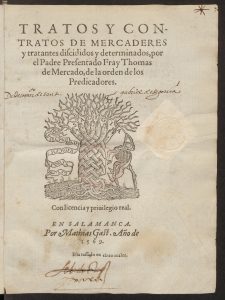
The history of probabilism has been the subject of important recent publications on scholastic legal and theological thought (Tutino, OUP, 2018; Schüssler, Brill, 2019). Nevertheless, the contribution of the specific historical context and global dimension of the early modern period’s enormous political, religious and economic changes to the emergence of probabilism has usually been underestimated and has received little attention. However, by exploring the missionary and mercantile fields and the writings of members of the School of Salamanca such as Francisco de Vitoria, Tomás de Mercado and Alonso de la Vera Cruz, José Luis Egío showed how the increasing use of probable argumentation was one of the many strategies employed by jurists and theologians to accommodate or translate the normative framework of European theology and canon law to new and unforeseen contexts and to try to answer new dubia.
(English) Summer School «Baroque Scholasticism» and Workshop «Baroque Scholasticism and Early Modern Thought»
Date: 26.-30.08.2019
Place: MPIeR, Lecture Hall (Z01)
The Summer School looks at the contribution of the Baroque Scholastics to the 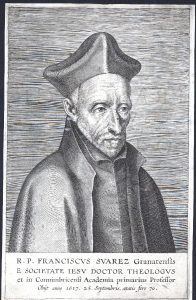 development of modern philosophy. It offers all students and doctoral researchers with a serious interest in scholastic thought of the Baroque era (roughly between the 1560s, the end of the Council of Trent, to 1789, the French Revolution) an occasion to deepen their involvement with this subject under the guidance of internationally renowned scholars in the field.
development of modern philosophy. It offers all students and doctoral researchers with a serious interest in scholastic thought of the Baroque era (roughly between the 1560s, the end of the Council of Trent, to 1789, the French Revolution) an occasion to deepen their involvement with this subject under the guidance of internationally renowned scholars in the field.
The aim of Summer School and Workshop is to increase the visibility of Baroque scholastic thought and to promote its investigation as the rise of modern philosophy during this period cannot be understood satisfactorily without accounting for the still flourishing and dynamically developing contemporaneous scholastic thought.
Summer School and Workshop are organized and led by Rudolf Schuessler (Bayreuth) and Marko Fuchs (Bamberg) in cooperation with the team of the Salamanca project.
From the project team, Andreas Wagner will hold a lecture about Political Theory Between Scholastic Theology, Aristotelian Philosophy and Law, whereas José Luis Egío will offer a workshop on the topic of Fighting Canonists with Probabilities. Juridical and Theological Truths in Some Masters of the School of Salamanca (Vitoria, Vera Cruz, Báñez).
The lectures and workshops will be held in English.
(English) How to Get to «Seuilla»: Dealing with Early Modern Orthography in a Search Engine
One of the central tools for working with the texts in the School of Salamanca‘s digital collection of sources is our digital edition’s search functionality, which is supposed to provide an easy-to-use means for querying single texts or the whole corpus for search terms. Speaking from a technical perspective, the quality of this search functionality – or, more precisely, the search engine that it is powered by – depends on several resources that it needs to be provided with, such as high-quality dictionaries for the languages in the corpus as well as a suitable setup for the search engine’s ‘indexing’ of the texts. As we recently encountered a demand to adjust the functioning of our search engine in a rather fundamental way due to some specific orthographic properties of the texts we are dealing with, I would like to use this opportunity to give a rough (and, hopefully, not too technical) overview of the functioning of our search before going into detail about the problem at hand.
In the case of our digital edition, the search functionality is currently based on a Sphinxsearch engine that provides our web application with search results in the following way: whenever a user triggers a search (say, for the Latin term «lex»), the web application sends a request to the Sphinxsearch engine (that is, a data server independent from the web application) asking for all text snippets that include the search term, or a term derived from its lemma (such as «leges» or «legum»), or even – if they are available in the engine’s dictionaries – translated forms of the term (hence, in this case, we would also find the Spanish term «ley»). These snippets, which are returned by the search server after it has gone through its indexes, are then displayed in the search results view in our webpage. Of course, this works only if the search server has already indexed these snippets beforehand (where ‘indexing’ generally means the process of storing and making the text snippets searchable), so that it can quickly fetch them on demand. Therefore, whenever a new work is being published in our digital collection, text snippets for the respective work are created through the web application, and a nightly indexing routine of the search server regularly requests all available snippets from the web app, thus making sure that the snippets it holds are updated on a day-to-day basis. As one might already guess with regards to the prevalence of the term ‘index(ing)’ in this paragraph, a suitable configuration of the indexing routine is of central importance for a well-functioning search engine, and it is precisely the configuration of the indexing which we recently had to revise fundamentally due to a problem that we were hinted at by users of the search function.
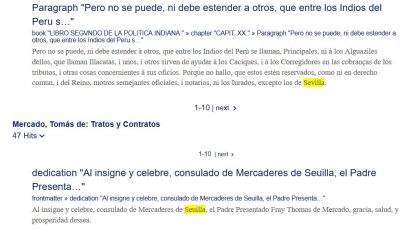 In our Latin and Spanish texts, a frequent orthographic pattern is the interchangeability of certain characters like «u» or «i» such that a word may occur in different forms throughout texts from the same period, or even within the same text, without varying in its meaning. To take a concrete example, it is not unusual in our texts to find a word like «Sevilla» (the city in Spain) also as «Seuilla» or, potentially, even as «Sebilla». In this example, the interchangeability of characters applies to the characters «v», «u», and «b», but it may also involve other frequently-used character pairings such as «i» and «j» (e.g., «ius» vs. «jus»), as well as some more rarely and, for the modern reader, more unexpectedly occurring pairings such as «j» and «x» (e.g., «dejar» vs. «dexar»).
In our Latin and Spanish texts, a frequent orthographic pattern is the interchangeability of certain characters like «u» or «i» such that a word may occur in different forms throughout texts from the same period, or even within the same text, without varying in its meaning. To take a concrete example, it is not unusual in our texts to find a word like «Sevilla» (the city in Spain) also as «Seuilla» or, potentially, even as «Sebilla». In this example, the interchangeability of characters applies to the characters «v», «u», and «b», but it may also involve other frequently-used character pairings such as «i» and «j» (e.g., «ius» vs. «jus»), as well as some more rarely and, for the modern reader, more unexpectedly occurring pairings such as «j» and «x» (e.g., «dejar» vs. «dexar»).
The problem with such interchangeable characters, from a search engine’s point of view, is that the engine does not know about their equivalence and thus cannot yield the whole set of search results for certain queries. For example, if a user searches for the above-mentioned «Sevilla» in its modern spelling, the engine will only return results in which the exact character string «Sevilla» occurs, but not strings like «Seuilla» or «Sebilla».
There are, however, certain ways to cope with this problem. One quick (and, from a system administrator’s perspective, quite lazy) solution would be to advise the user to be aware of this problem and to anticipate it in her search queries. For instance, our search engine allows for the use of ‘regular expressions’ in queries, which makes it possible to replace certain characters by so called ‘wildcards’: in this way, all possible forms of «Sevilla» could be found by using a query string such as «Se?illa», where the «?» question mark stands for any character. As this «solution» would demand quite a lot of anticipation from the user, who may not be aware of all the pitfalls of early modern orthography, it is not a very good option. In general, we want to facilitate the usage of our digital tools for the user as much as possible, and this certainly includes the search functionality as a central component of the toolset.
A second possible solution, then, would be to extend the dictionaries of word forms that are used to index the text snippets in such a way that for any word form containing one or more interchangeable characters we also add all its different forms to the respective dictionary. Unfortunately, this is practically unfeasable in a manual and «scholarly controlled» way, since our dictionaries of word forms currently hold between 600,000 (Spanish) and over 2,000,000 (Latin) word forms (and counting). Any endeavour to manually add word forms – even if one would only stick to important ones, such as names – would always represent an open-ended task. The only comprehensive and (ideally) complete solution thus seems to be an automatic replacing of word forms, and fortunately, this is where the Sphinxsearch engine offers quite handy configuration options.
In the configuration for the indexing routine, Sphinxsearch allows for the definition of certain directives that can be used to enhance, speed up, or tweak the indexing (and, thus, the searchability of words). In particular, there is a charset_table directive that can be used for stating which symbols should be relevant for the index, and this directive also makes it possible to map characters to other characters. Until now, for example, the character mapping configuration read as follows:
charset_type = utf-8
charset_table = 0..9, A..Z->a..z, a..z, U+C0..U+FF, U+100..U+17F, U+1C4..U+233, U+370..U+3E1, U+590..U+5FF, U+400..U+7FF, U+500..U+8FF
Here, we first declare the «utf-8» encoding (which is one of the prevalent encodings for the nowadays ubiquitous Unicode character set) as the encoding to be applied for indexing text snippets. The charset_table field then determines which characters are relevant for the indexing routine, and, if required, which of those characters shall be regarded as equivalent to other characters. In this setting, for example, we have stated that we consider digits between 0 and 9 as relevant (0..9), and that all capitalized characters are to be treated as lowercased characters (A..Z->a..z) such that a query for the term «Sevilla» will also find the lowercased form «sevilla» (of course, we also need to declare these lowercased characters as relevant for indexing through the , a..z, segment). Furthermore, we have extended the set of relevant symbols by including the Latin Extended A character block (that is, Unicode symbols in the range between codepoints «U+0100» and «U+017F»: U+100..U+17F) and certain parts of other Unicode blocks such as Latin Extended B, Greek and Coptic, etc.
Now, the solution to our problem lies in the possibility of mapping characters to other characters. Similar to the above-mentioned way of mapping capitalized characters to lowercased characters, we can map a character such as «u» to a completely different character such as «v», thereby evoking the desired effects of character normalization:
charset_table = 0..9, A..I->a..i,J->i,j->i,K..T->k..t,U->v,u->v,V..Z->v..z,a..i,k..t,v..z,U+C0..U+FF, U+100..U+17F, U+1C4..U+233, U+370..U+3E1,U+590..U+5FF, U+400..U+7FF, U+500..U+8FF
What simply was A..Z->a..z (the mapping of all capitalized characters «A-Z» to their lowercased equivalents) in the previous configuration has now become slightly more complicated:
[...,]A..I->a..i,J->i,j->i,K..T->k..t,U->v,u->v,V..Z->v..z,a..i,k..t,v..z,[...]
Here, we first map all capitalized characters «A..I» to their lowercased equivalents, but then we map the capitalized and lowercased «J»/»j» to the lowercased «i» (not «j»). Equally, after mapping all characters between «K..T» to their equivalents «k..t», we apply a mapping for «U»/»u», which are both to be treated as «v» by the indexing routine. Like this, we effectively declare «J»/»j» and «i» as well as «U»/»u» and «v» as equivalent characters, thus normalizing j/i and u/v for any search query. Note that the mapping/replacement of characters stated here has effect only for the «internal» indexing of the snippets in the search engine, but does not actually transform the text snippets displayed to the user in the end by any means.
For the time being, we have refrained from defining further normalizations such as with «v» and «b», or «j» and «x», since it is not yet fully clear to us what (unexpected) effects such all-encompassing character normalizations might have, especially in «exotic» use cases that we cannot even imagine. In particular, ‘transitive’ normalization effects are something that we still need to experiment with: If «j» and «i» are equivalent and «j» and «x» are equivalent, then «i» and «x» are also equivalent, although «i» and «x» might not have been used in such an interchangeable manner in early modern texts. Therefore, we very much welcome any further suggestions – also beyond the character pairings mentioned here – that we can use for enhancing our search engine further.
(English) The School of Salamanca: New Digital Edition of Melchor Cano’s «Relectio de Poenitentia» now online
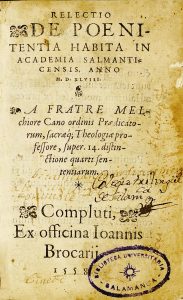 Melchor Cano (1509-1560) is one of the most important authors of the School of Salamanca: as a pupil of Francisco de Vitoria, he entered the Dominican Order at the age of fifteen. Ten years later, Cano received his first theological chair in Valladolid; after the death of his academic teacher Vitoria in 1546 he took over the renowned cátedra de Prima in Salamanca himself. Cano participated in the political debates about the Spanish conquest of the Americas, among other things as a commission member in the so-called controversy of Valladolid, in which the different points of view clashed in the persons of the protagonists Bartolomé de Las Casas and Juan Ginés de Sepúlveda.
Melchor Cano (1509-1560) is one of the most important authors of the School of Salamanca: as a pupil of Francisco de Vitoria, he entered the Dominican Order at the age of fifteen. Ten years later, Cano received his first theological chair in Valladolid; after the death of his academic teacher Vitoria in 1546 he took over the renowned cátedra de Prima in Salamanca himself. Cano participated in the political debates about the Spanish conquest of the Americas, among other things as a commission member in the so-called controversy of Valladolid, in which the different points of view clashed in the persons of the protagonists Bartolomé de Las Casas and Juan Ginés de Sepúlveda.
In 1547, one year after becoming professor in Salamanca, Cano held the public lecture De Poenitentia, in which he dealt with central questions of confession and the sacrament of penance. The elaborated version of this unusually long and detailed text, which comprises more than 170 printed pages, he prepared for publication in 1550. This first edition is now available in full text and digital images in the source collection of the project «The School of Salamanca».
The School of Salamanca. A Digital Collection of Sources and a Dictionary of its Juridical-Political Language is a joint project of the MPIeR, the Goethe University Frankfurt and the Academy of Sciences and Literature, Mainz.
